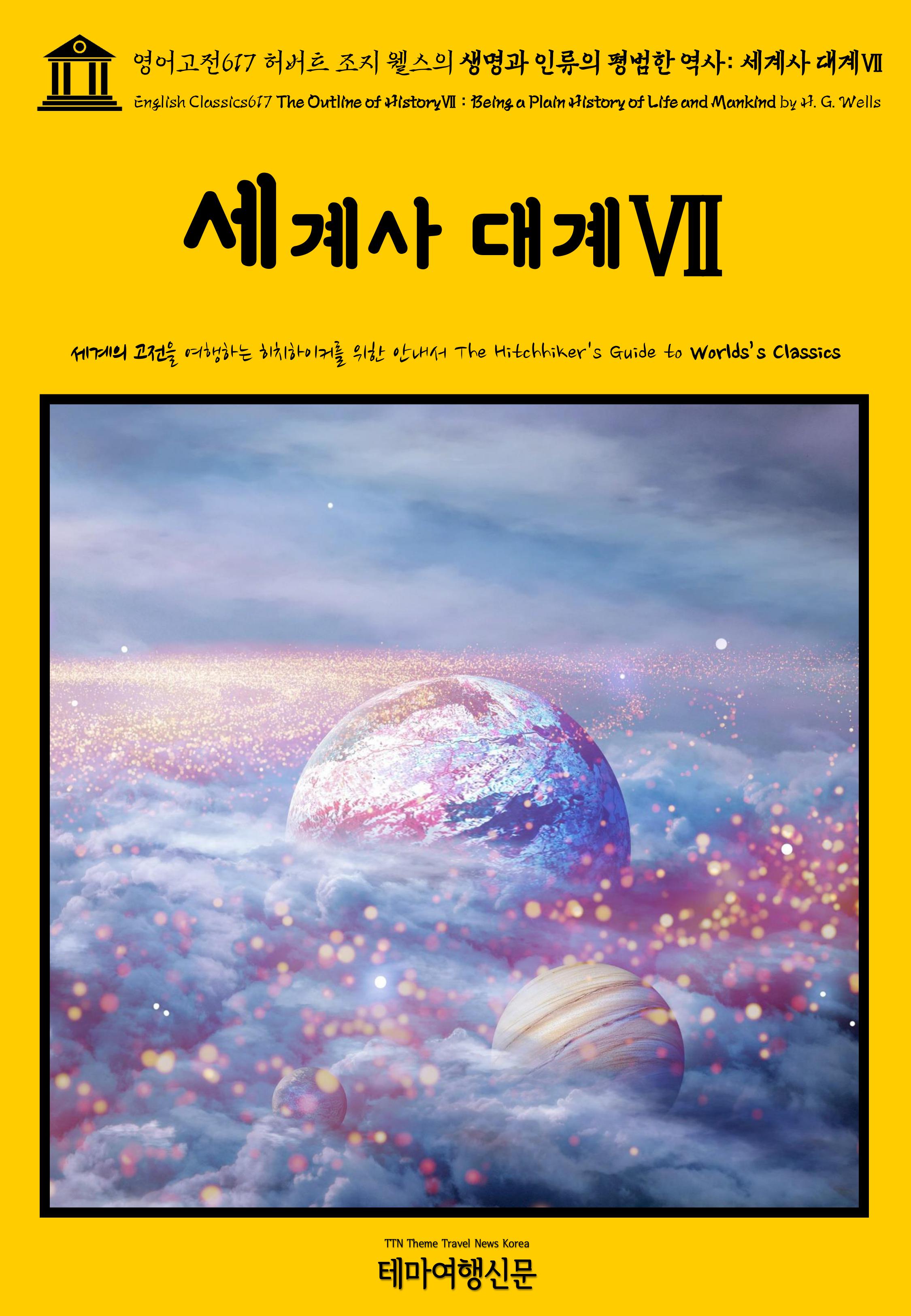▶ 인류의 모든 이야기(The Whole Story of Man) 또는 생명과 인류의 평범한 역사가 되는 것(Being a Plain History of Life and Mankind) : 세계사 대계(The Outline of History)(1920)는 허버트 조지 웰스(H. G. Wells)(1866~1946)의 역사서(history book)입니다. 웰스는 소설가이기 이전에 당대의 지식인이자 역사가, 그리고 교육에 관심이 많은 작가로써 1919년부터 지구의 기원(The origins of the Earth)부터 웰스가 직접 경험한 제1차 세계 대전(The Great War)(1914~1918)까지 세계역사를 연대기별로 일목요연하게 정리해 격주로 연재하기 시작하였습니다. 1920년 연재한 원고를 세계사 대계(The Outline of History)(1920)란 이름의 단행본으로 출간하였으며, 영국을 비롯한 세계 각지에 번역 출간될 정도로 큰 인기를 끌었습니다.
현재까지 최소 200만부 이상이 판매되었으며, 당대 영국 고등 교육기관에서 역사 교육을 위한 필독서로 사랑받았습니다. 또한 조지 웰스는 세계 각지의 오류에 대한 지적을 겸허히 수용하였고, 1937년까지 자신이 직업 원고를 수정하여 개정판을 발간하였습니다. 원고의 완성도 못지않게 당대 유럽인의 우생학과 제국주의에 대한 지지에도 불구하고, 인종주의와 문명적 우월성을 주장하는 이론(theories of racial and civilizational superiority)을 비판한 대목은 현대의 독자에게도 눈여겨볼 만합니다.
▶ THE RACES OF MANKIND. In the early Neolithic Period in Europe?it may be 10,000 or 12,000 years ago or so?man was differentiating all over the world, and he had already differentiated into a number of varieties, but he has never differentiated into different species. A “species,” we must remember, in biological language is distinguished from a “variety” by the fact that varieties can interbreed, while species either do not do so or produce offspring which, like mules, are sterile. All mankind can interbreed freely, can learn to understand the same speech, can adapt itself to co-operation.
인류의 종(種). 10,000~12,000년 전쯤으로 추정되는 유럽의 초기 신석기 시대에 인간은 전 세계적으로 분화하고 있었고 이미 많은 변종으로 분화했지만 다른 종으로 분화한 적은 한 번도 없습니다. 생물학적 언어에서 "종"은 품종이 서로 교배할 수 있는 반면 종은 그렇게 하지 않거나 노새처럼 불임의 자손을 낳는다는 사실에 의해 "다양성"과 구별된다는 사실을 기억해야 합니다. 모든 인류는 자유롭게 교배할 수 있고 같은 말을 이해하는 법을 배울 수 있으며 협력에 적응할 수 있습니다.
▶ 그가 사망한 이후에는 영국 편집자 레이몬드 포스트게이트(Raymond Postgate)(1896~1971)가 제2차 세계 대전(Second World War, WWII)(1939~1945)을 추가하고, 작가의 아들 G. P. 웰스(G. P. Wells)(1901~1985)가 선사시대에 대한 최신 이론을 추가하는 등 지속적으로 업데이트하였습니다. 테마여행신문 TTN Korea 영어고전(English Classics)과 함께 어제도, 오늘도, 내일도 멋진 문학여행을! B
▶ WE have to tell now of the last and greatest of all the raids of nomadism upon the civilizations of the East and West. We have traced in this history the development side by side of these two ways of living, and we have pointed out that as the civilizations grew more extensive and better organized, the arms, the mobility, and the intelligence of the nomads also improved. The nomad was not simply an uncivilized man, he was a man specialized and specializing along his own line. From the very beginning of history the nomad and the settled people have been in reaction.
유목민주의가 동서양의 문명을 침략한 마지막, 가장 위대한 사건을 지금 이야기해야 합니다. 우리는 이 역사에서 이 두 가지 삶의 방식을 나란히 추적해 왔습니다. 그리고 우리는 문명이 더 광범위하고 더 잘 조직화됨에 따라, 유목민들의 무장, 이동성, 지능도 향상되었다고 지적했습니다. 유목민들은 단순히 미개한 사람이 아니라 자신의 계통을 따라 전문화되고 전문화된 사람이었습니다. 역사의 시작부터 유목민들과 정착민들은 반응해 왔습니다.
▶ JUDGED by the map, the three centuries from the beginning of the thirteenth to the end of the fifteenth century were an age of recession for Christendom. These centuries were the Age of the Mongolian peoples. Nomadism from Central Asia dominated the known world. At the crest of this period there were rulers of Mongol or the kindred Turkish race and nomadic tradition in China, India, Persia, Egypt, North Africa, the Balkan Peninsula, Hungary, and Russia. The Ottoman Turk had even taken to the sea, and fought the Venetian upon his own Mediterranean waters.
지도에서 판단하건대, 13세기 초부터 15세기 말까지 3세기는 기독교의 불황의 시대였습니다. 이 세기는 몽골 민족의 시대였습니다. 중앙아시아에서 온 유목민주의는 알려진 세계를 지배했습니다. 이 시기의 최고봉에는 몽골의 통치자나 중국, 인도, 페르시아, 이집트, 북아프리카, 발칸 반도, 헝가리, 그리고 러시아에 유목민 전통과 같은 터키 종족의 통치자들이 있었습니다. 오스만 투르크는 심지어 바다로 갔고, 자신의 지중해 수역에서 베네치아인들과 싸웠습니다.
▶ We have given as much attention as we have done to the writings of Machiavelli and to the personality of Charles V because they throw a flood of light upon the antagonisms of the next period in our history. This present chapter has told the story of a vast expansion of human horizons and of a great increase and distribution of knowledge; we have seen the conscience of common men awakening and intimations of a new and profounder social justice spreading throughout the general body of the Western civilization. But this process of light and thought was leaving courts and the political life of the world untouched. There is little in Machiavelli that might not have been written by some clever secretary in the court of Chosroes I or Shi-Hwang-ti?or even of Sargon I or Pepi.
우리는 마키아벨리의 글과 찰스 5세의 성격에 대해 우리가 했던 것만큼 많은 관심을 기울여 왔습니다. 왜냐하면 그것들은 우리 역사에서 다음 시기의 적대감에 빛을 던지기 때문입니다. 이 현재 장은 인간의 지평의 광대한 확장과 지식의 엄청난 증가와 분배에 대한 이야기를 들려 주었습니다; 우리는 평범한 사람들의 양심이 깨어나는 것과 새롭고 심오한 사회 정의의 암시를 서구 문명의 전반으로 퍼지는 것을 보았습니다. 그러나 이러한 빛과 생각의 과정은 법원과 세계의 정치적 삶을 건드리지 않고 내버려두고 있었습니다. 마키아벨리에는 초로스 1세나 시황티, 심지어 사르곤 1세나 페피의 궁정에서 영리한 비서가 쓰지 않았을지도 모르는 것이 거의 없습니다.






